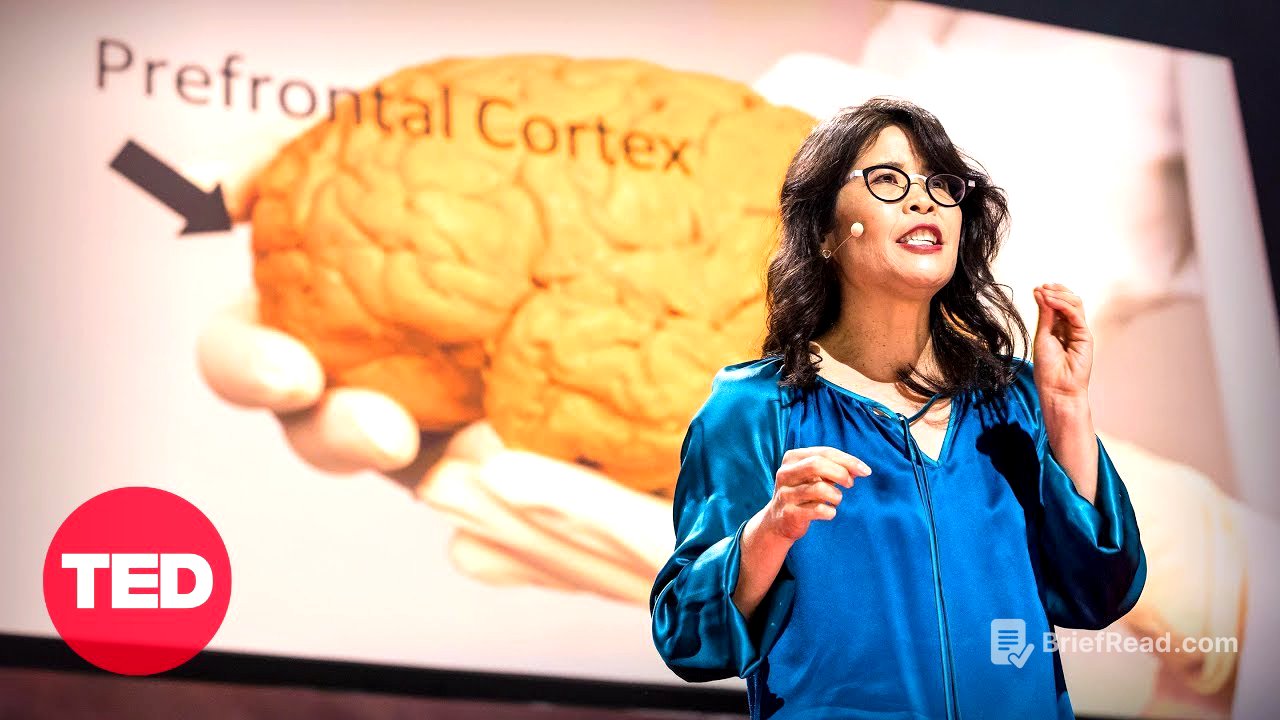TLDR;
Wendy Suzuki discusses the transformative effects of physical activity on the brain. She explains how exercise has immediate, long-lasting, and protective benefits, including improved mood, focus, memory, and protection against neurodegenerative diseases. She shares her personal journey of discovering these benefits and encourages incorporating regular exercise into daily life.
- Exercise has immediate positive effects on mood and focus due to increased neurotransmitters.
- Long-term exercise changes brain anatomy, increasing the size of the hippocampus and improving attention.
- Exercise protects the brain against neurodegenerative diseases by strengthening the prefrontal cortex and hippocampus.
Introduction: The Power of Physical Activity [0:12]
Wendy Suzuki introduces the idea that physical activity has immediate and lasting positive effects on the brain, including mood and focus enhancement, and protection against conditions like depression, Alzheimer's disease, and dementia. She frames the talk as a story of how she, as a neuroscientist, experimented on herself and discovered the science behind exercise's transformative power.
Understanding the Brain: Key Areas [1:15]
Suzuki explains the complexity of the brain and highlights two key areas: the prefrontal cortex, critical for decision-making, focus, attention, and personality, and the hippocampus, located in the temporal lobe, essential for forming and retaining new long-term memories. She expresses her fascination with how the hippocampus can store memories that last a lifetime.
A Neuroscientist's Personal Experiment [2:30]
Suzuki recounts her decision to shift her research focus after personally experiencing the brain-changing effects of exercise. She describes how, despite professional success in memory research, she realised she had neglected her physical and social well-being. A river-rafting trip motivated her to start exercising, leading to improvements in mood, energy, and focus.
The Science of Exercise and the Brain [5:55]
Suzuki explains that her personal experience led her to research the effects of exercise on the brain, confirming her observations of improved mood, energy, memory, and attention. This prompted her to shift her research focus to understanding how exercise transforms the brain.
Three Reasons Exercise is Transformative [6:43]
Suzuki outlines three key reasons why exercise is transformative for the brain. Firstly, it has immediate effects, increasing neurotransmitters like dopamine, serotonin, and noradrenaline, improving mood and focus. Secondly, it has long-lasting effects, changing the brain's anatomy, physiology, and function, increasing the size of the hippocampus and improving attention. Finally, it offers protective effects, strengthening the brain against neurodegenerative diseases.
Long-Lasting Effects of Exercise on the Brain [7:38]
Suzuki elaborates on the long-lasting effects of exercise, noting that it promotes the creation of new brain cells in the hippocampus, increasing its volume and improving long-term memory. Additionally, exercise enhances attention function dependent on the prefrontal cortex and provides sustained improvements in mood.
Protective Effects of Exercise on the Brain [8:39]
Suzuki describes the protective effects of exercise, comparing the brain to a muscle that gets stronger with use. Regular exercise strengthens the hippocampus and prefrontal cortex, making them more resilient to neurodegenerative diseases like dementia and Alzheimer's. She likens exercise to a "supercharged 401K" for the brain.
The Minimum Amount of Exercise Needed [9:39]
Suzuki addresses the question of the minimum amount of exercise needed to achieve these benefits, recommending three to four times a week for at least 30 minutes per session, focusing on aerobic exercise to elevate the heart rate. She notes that exercise doesn't require a gym membership and can be incorporated into daily activities like walking and taking stairs.
From Memory Pioneer to Exercise Explorer [10:31]
Suzuki discusses her transition from studying memory to exploring the effects of exercise on brain function. Her current goal is to determine the optimal exercise prescription for individuals based on age, fitness level, and genetic background, to maximise the benefits for brain health.
Interactive Exercise [11:15]
Suzuki leads the audience in a one-minute exercise routine, incorporating call-and-response affirmations to promote feelings of strength, inspiration, and energy.
Conclusion: Changing the Trajectory of Your Life [12:31]
Suzuki concludes by emphasising that incorporating exercise into one's life leads to a happier, more protected life and safeguards the brain from incurable diseases, ultimately changing the trajectory of life for the better.









